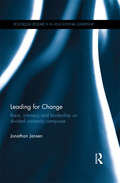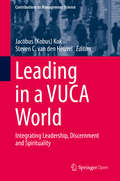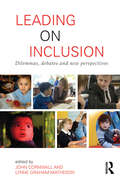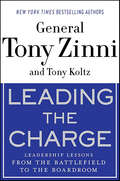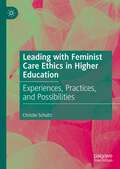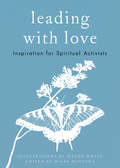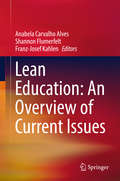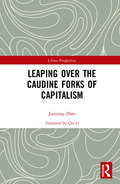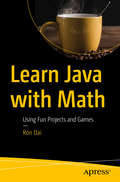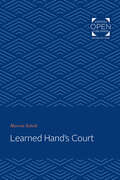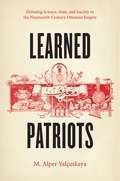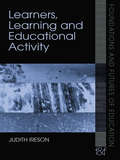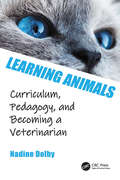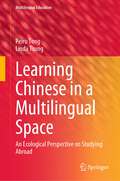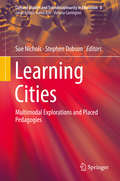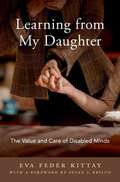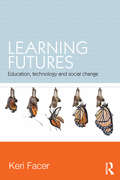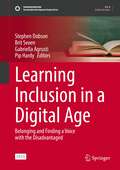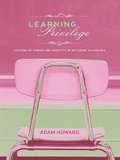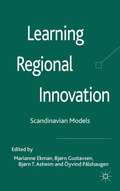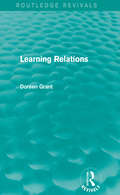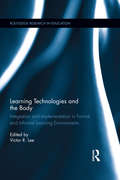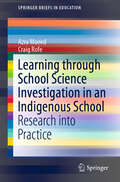- Table View
- List View
Leading for Change: Race, intimacy and leadership on divided university campuses (Routledge Research in Educational Leadership)
by Jonathan JansenThis book offers new theoretical ground for thinking about, and transforming, leadership and higher education worldwide. Through an examination of the construct of intimacy and ‘nearness’, including emotional, spiritual, psychic, intellectual, and physical closeness, Jonathan Jansen demonstrates its power to influence positive leadership in young people. He argues that sensory leadership, which includes but extends beyond the power of touch, represents a fresh and effective approach to progressive transformation of long divided institutions. Considering richly textured narratives, chapters explore complex intimacies among Black and White university students in South Africa, post-apartheid and in the aftermath of a major racial atrocity. The stories reveal the students’ transformation in the process of ‘leadership for change’, interweaving concepts of racism, human relationships and intimacy, and in turn expanding the knowledge base of social and institutional improvement. This book explores how, when different kinds of nearness come together in leadership change, young people respond in ways that would not be possible through conventional instruments such as policy, legislation and the appeal to moral sensibilities alone. Leading for Change will be critical reading for academics, researchers and postgraduate students in the fields of education, educational justice, higher education, educational leadership and change, social and/or racial justice. This book will also be of interest to those working in the fields of anthropology, social psychology, and South African contemporary politics, policy and institutional practices.
Leading in a VUCA World: Integrating Leadership, Discernment and Spirituality (Contributions to Management Science)
by Jacobus Kobus Kok Steven C. van den HeuvelThis open access book brings together works by specialists from different disciplines and continents to reflect on the nexus between leadership, spirituality and discernment, particularly with regard to a world that is increasingly volatile, uncertain, complex, and ambiguous (VUCA). The book spells out, first of all, what our VUCA world entails, and how it affects businesses, organizations, and societies as a whole. Secondly, the book develops new perspectives on the processes of leadership, spirituality, and discernment, particularly in this VUCA context. These perspectives are interdisciplinary in nature, and are informed by e.g. management studies, leadership theory, philosophy, and theology.
Leading on Inclusion: Dilemmas, debates and new perspectives
by Lynne Graham-Matheson John CornwallLeading on Inclusion: Dilemmas, debates and new perspectives critically examines the current theory and legislative context of special educational needs and disability, and explores the enduring issues and opportunities that will affect future practice in all schools. The central theme throughout the book asks the inevitable question ‘What happens next?’ and the expert team of contributors, drawn from a pool of teachers, academics and researchers, consider wide-ranging issues such as: the voice of young people whole school development and planning for inclusion educational change within the context of inclusion the pros and cons of multi-professional working inclusive and ethical research international perspectives on inclusion, SEN and disability the development of teacher education and the notion of ‘joined up’ thinking. This forward-thinking and rigorously researched book will be essential reading for students, teachers undertaking school-based training, SENCOs, inclusion managers, higher education tutors and anyone with a professional interest in the future for inclusive education.
Leading the Charge: Leadership Lessons from the Battlefield to the Boardroom
by Tony Koltz Tony Zinni"What's happened to our leaders and to our leadership?"Based on General Zinni's leadership experiences from the battlefield to the boardroom, Leading the Charge shows a new way through the significant leadership challenges of the 21st century.The times are changing at an ever-increasing velocity. Old systems, organizations, and ways of operating no longer work in our dynamic, complex and increasingly unstable new environment. Out of this chaos and confusion, a new and different leader must emerge. Old systems and methods will no longer work. Leading the Charge is a visionary leadership book that examines the trends that have reshaped our world and the ways in which visionary leaders and organizations can effectively respond. Tomorrow's successful leaders--in all fields, including the military, academia, politics, and business--must know how to create, operate, and thrive in very fluid, flattened, and integrated structures that are remarkably different from the traditional organizations we are used to seeing. They will have to manage rapidly changing technology and flows of information, and create faster and more far-reaching spans of control. Leading the Charge shows the way, and is an incisive and compelling guide to the new world of leadership, one that will prove indispensable for years to come.Organized around "Leading a New World," a revolutionary leadership course General Zinni developed and taught at the Terry Sanford Institute of Public Policy at Duke University, Leading the Charge makes a convincing case that leaders must . . . - change with the times to be relevant.- be ready for crisis mode at any given time.- have a moral compass and the ability to steer the company in the right direction.- be forward thinking, not reactive, to provide innovation and creativity.- develop great leaders.
Leading with Feminist Care Ethics in Higher Education: Experiences, Practices, and Possibilities
by Christie SchultzThis book explores how academic leaders throughout higher education experience and practice care and the ethics of care. Drawing on a narrative inquiry study of experiences and practices of feminist care ethics in higher education leadership, Schultz counters academic norms, including expectations of competition and criticism across all activities, by uncovering the common experiences of academic leaders who intentionally adopt practices guided by an ethics of care and relationality. Within the context of institutions of higher education responding to present-day social movements, the book highlights how practices of care-centered leadership can enable change that begins on campus and reaches outwards to positively impact the community.
Leading with Love: Inspiration for Spiritual Activists
by Hisae Matsuda Maude WhiteWhen the world is burning with anger, divisiveness, and fear, this book of inspiring quotes selected by the editors of Parallax Press is a still, small voice in the storm that will bring peace of mind to the reader. With delicate illustrations by artist Maude White, this book speaks to the vulnerability and courage of holding space for the loving, connected, and more beautiful world our hearts know is possible.This book is gift, solace, and inspiration for idealists, progressives, and anyone fighting the good fight. In the long tradition of spiritual activists from Martin Luther King Jr and Thich Nhat Hanh to new and less known voices, this book of 100 quotes draws from a range of contemplative traditions and offers wisdom and nourishment for anyone engaged in working for a more compassionate world. Quotes include those by Thich Nhat Hanh, Sister Chan Khong, Joanna Macy, Sulak Sivaraksa, and others, on themes of awareness, idealism, kindness, self-compassion, truth-telling, transformation, resilience, and love.
Lean Education: An Overview of Current Issues
by Franz-Josef Kahlen Shannon Flumerfelt Anabela Carvalho AlvesThis edited volume presents a structured approach to a new lean education curriculum, implemented for the education of engineers, managers, administrators as well as human resources developers. The authorship comprises professors and lecturers, trainers and practitioners who educate future professionals in Lean Thinking principles and tools. This edited book provides a platform for authors to share their efforts in building a Body of Knowledge (BoK) for Lean Education. The topical spectrum is state-of-the-art in this field, but the book also includes a glimpse into future developments. This is a highly informative and carefully presented book, providing valuable insight for scholars with an interest in Lean Education.
Leaping Over the Caudine Forks of Capitalism (China Perspectives)
by Zhao JiaxiangIn the four volumes of The Development Trajectory of Eastern Societies and the Theories and Practices of Socialism, the author re-examines the Marx and Engel’s theories on the development trajectory of Eastern societies by integrating theoretical analysis of Marxist theories and a historical investigation of socialist revolution and construction around the world. This volume discusses the desire of the Russian commune to “leap over the Caudine Forks of capitalism,” which means to avoid the torments of the capitalist system, according to Marx and Engels’ theories. The author argues that it is essential to use the logic intrinsic in Marx and Engels’ own works rather than those of subsequent disciples such as Lenin as well as other leaders in the Soviet Union or within China’s contemporary socialism. Readers who study Marxism, Marxist philosophy, philosophical history, and the history of philosophy will find this volume interesting.
Learn Java with Math: Using Fun Projects and Games
by Ron DaiThere are many good Java programming books on the market, but it's not easy to find one fit for a beginner. This book simplifies the complexity of Java programming and guides you through the journey to effectively work under the hood. You'll start with the fundamentals of Java programming and review how it integrates with basic mathematical concepts through many practical examples. You'll witness firsthand how Java can be a powerful tool or framework in your experimentation work.Learn Java with Math reveals how a strong math foundation is key to learning programming design. Using this as your motivation, you'll be programming in Java in no time.What You'll LearnExplore Java basicsProgram with Java using fun math-inspired examplesWork with Java variables and algorithmsReview I/O, loops, and control structuresUse projects such as the Wright brothers coin flip gameWho This Book Is ForThose new to programming and Java but have some background in mathematics and are at least comfortable with using a computer.
Learned Hand's Court
by Marvin SchickOriginally published in 1970. This is a study of one of the most highly respected tribunals in the history of the English-speaking world—the United States Court of Appeals for the Second Circuit. Situated in Manhattan, the Second Circuit Court, serving New York, Connecticut, and Vermont, is the most important commercial court in the country. But, like other inferior courts, it has never been studied in depth. Marvin Schick provides a comprehensive analysis. From 1941 to 1951, Learned Hand presided over the Second Circuit as chief judge, and the court bore his stamp. But on its bench sat other men of great competence, judges Thomas W. Swan, August N. Hand, and Harrie B. Chase, as well as Charles E. Clark and Jerome N. Frank, whose constant disagreement characterized much of the court's work. Schick studies the Second Circuit Court from several angles: historical, biographical, behavioral, and case analytical. He tells a history of the court from its origins in 1789. He provides biographical sketches of the six judges who sat during Learned Hand's tenure as chief judge. He analyzes the many decisions handed down by the court, including the precedent setters. He examines the court's decision-making process, especially its unique procedures such as the memorandum system, which requires from the judges "preliminary opinions" in the cases they hear. A novel feature of this book is the correlation of votes of the Second Circuit judges with subsequent decisions of the Supreme Court.Schick was aided in his study by having access to the private papers of Judge Clark. These thousands of memoranda and letters throw much light on the workings of the Second Circuit Court and reveal the bargaining that went on among the judges in difficult cases. The Clark papers make possible a clearer understanding of the incessant conflict between Clark and Frank and show how this unusual relationship gave vitality to the Second Circuit.
Learned Patriots: Debating Science, State, and Society in the Nineteenth-Century Ottoman Empire
by M. Alper YalcinkayaThe nineteenth century was, for many societies, a period of coming to grips with the growing, and seemingly unstoppable, domination of the world by the "Great Powers” of Europe. The Ottoman Empire was no exception: Ottomans from all walks of life--elite and non-elite, Muslim and non-Muslim--debated the reasons for what they considered to be the Ottoman decline and European ascendance. One of the most popular explanations was deceptively simple: science. If the Ottomans would adopt the new sciences of the Europeans, it was frequently argued, the glory days of the empire could be revived. In Learned Patriots, M. Alper Yalçinkaya examines what it meant for nineteenth-century Ottoman elites themselves to have a debate about science. Yalçinkaya finds that for anxious nineteenth-century Ottoman politicians, intellectuals, and litterateurs, the chief question was not about the meaning, merits, or dangers of science. Rather, what mattered were the qualities of the new "men of science. ” Would young, ambitious men with scientific education be loyal to the state? Were they "proper” members of the community? Science, Yalçinkaya shows, became a topic that could hardly be discussed without reference to identity and morality. Approaching science in culture, Learned Patriots contributes to the growing literature on how science travels, representations and public perception of science, science and religion, and science and morality. Additionally, it will appeal to students of the intellectual history of the Middle East and Turkish politics.
Learners, Learning and Educational Activity (Foundations and Futures of Education)
by Judith IresonLearners, Learning and Educational Activity offers a new and creative approach to the psychology of learning. The central idea in the book is that learning in schools and other educational settings is best understood by paying attention to both individual learners and the educational contexts in which learning takes place. Providing an accessible introduction to new ideas and recent developments in cognitive and socio-cultural perspectives on learning, the book reviews advances in selected topics that are especially relevant for teachers and other educators. These include: learners’ conceptions of the nature of learning the development of advanced levels of learning and thinking the role of motivation and self-regulation in learning how learning and thinking relate to social and cultural contexts the ways in which these contexts influence interactions between teachers and learners. By illustrating connections between individual and social aspects of learning in educational settings in and out of school, the book encourages teachers, parents and other educators to think about learners and learning in new ways.
Learning Animals: Curriculum, Pedagogy and Becoming a Veterinarian
by Nadine DolbyWe are surrounded by thousands of animals, alive and dead. They are an intimate and ever-present part of our human lives. As a society, we privilege veterinarians as experts on these animals: they are our educators and teachers in what they say, what they do, and the decisions that they make. Yet, within the field of education, there is little research on the curriculum, pedagogy, and experiences of veterinary school and students. What do veterinarians learn in veterinary school? How do their experiences during those four years shape their perceptions of animals? How do the structures, curriculum, and pedagogy of veterinary college create and influence these experiences? Learning Animals opens up this conversation through an exploration of the complicated, fascinating and often painful stories of a cohort of veterinary students as they make their four-year journey from matriculation through graduation. The book examines how the experiences of veterinary students shape how humans relate to animals, from public policy and decision-making about the environment and animals slaughtered for food, to the most personal decisions about euthanizing companion animals. The first full-length, critical, qualitative study of the perspectives of our primary teachers about animals, this will be a thought-provoking read for those in the fields of both educational research and veterinary education.
Learning Chinese in a Multilingual Space: An Ecological Perspective on Studying Abroad (Multilingual Education #41)
by Linda Tsung Peiru TongThis book examines the benefits of an Australian in-country study (ICS) in China programme and explores ways to maximise the short-term ICS experience in a multilingual space. The book employs an ecological perspective which has seldom been used to examine the study abroad context. It emphasises the importance of the space itself as an arena of interaction, belonging and power, where conduct and modes of communication are often regulated by political authorities and societal expectations. Specifically, the book focuses on the following: • the extent to which the ICS facilitated interaction in different settings • the way in which interaction during ICS contributed to language learning • the degree in which the interaction during ICS contributed to culture learning and • the role of identity in the learning process in the ICS. The main argument of the book is that while the ICS promoted multilingual learning space for in-class and out-of-class interactions, which further facilitated language and culture learning to a great extent, Australian students’ identities and self-concepts also played a core mediating role throughout individual learning trajectories.
Learning Cities: Multimodal Explorations And Placed Pedagogies (Cultural Studies and Transdisciplinarity in Education #8)
by Stephen Dobson Sue NicholsThis book is an interdisciplinary text exploring the learning and educative potentials of cities and their spaces, including urban and suburban contexts, at all stages of life. Drawing on the insights of researchers from diverse fields, such as education, architecture, history, visual sociology, applied linguistics and sensory studies, this collection of papers develops and demonstrates the connection between experience, in all its dimensions, and informal learning in the city. The chapters discuss various sensory domains of experience, considering visual, embodied, and even sexual dimensions in relation to what and how learning operates, and the contributors reflect on their learning and inquiring experiences in the city, with special reference to topics such as narrativity, ‘race’ and ethnicity, equity, urban literacy, re-generation, participation, representation and oral histories.
Learning From My Daughter: The Value And Care Of Disabled Minds
by Eva KittayDoes life have meaning? What is flourishing? How do we attain the good life? Philosophers, and many others of us, have explored these questions for centuries. As Eva Feder Kittay points out, however, there is a flaw in the essential premise of these questions: they seem oblivious to the very nature of the ways in which humans live, omitting a world of co-dependency, and of the fact that we live in and through our bodies, whether they are fully abled or disabled. Our dependent, vulnerable, messy, changeable, and embodied experience colors everything about our lives both on the surface and when it comes to deeper concepts, but we tend to leave aside the body for the mind when it comes to philosophical matters. Disability offers a powerful challenge to long-held philosophical views about the nature of the good life, what provides meaning in our lives, and the centrality of reason, as well as questions of justice, dignity, and personhood. These concepts need not be distant and idealized; the answers are right before us, in the way humans interact with one another, care for one another, and need one another--whether they possess full mental capacities or have cognitive limitations. We need to revise our concepts of things like dignity and personhood in light of this important correction, Kittay argues. <p><p> This is the first of two books in which Kittay will grapple with just how we need to revisit core philosophical ideas in light of disabled people's experience and way of being in the world. Kittay, an award-winning philosopher who is also the mother to a multiply-disabled daughter, interweaves the personal voice with the philosophical as a critical method of philosophical investigation. Here, she addresses why cognitive disability can reorient us to what truly matters, and questions the centrality of normalcy as part of a good life. With profound sensitivity and insight, Kittay examines other difficult topics: How can we look at the ethical questions regarding prenatal testing in light of a new appreciation of the personhood of disabled people? What do new possibilities in genetic testing imply for understanding disability, the family, and bioethics? How can we reconsider the importance of care, and how does it work best? In the process of pursuing these questions, Kittay articulates an ethic of care, which is the ethical theory most useful for claiming full rights for disabled people and providing the opportunities for everyone to live joyful and fulfilling lives. She applies the lessons of care to the controversial alteration of severely cognitively disabled children known as the Ashley Treatment, whereby a child's growth is halted with extensive estrogen treatment and related bodily interventions are justified. p> This book both imparts lessons that advocate on behalf of those with significant disabilities, and constructs a moral theory grounded on our ability to give, receive, and share care and love. Above all, it aims to adjust social attitudes and misconceptions about life with disability.
Learning Futures: Education, Technology and Social Change
by Keri FacerIn the twenty-first century, educators around the world are being told that they need to transform education systems to adapt young people for the challenges of a global digital knowledge economy. Too rarely, however, do we ask whether this future vision is robust, achievable or even desirable, whether alternative futures might be in development, and what other possible futures might demand of education. Drawing on ten years of research into educational innovation and socio-technical change, working with educators, researchers, digital industries, students and policy-makers, this book questions taken-for-granted assumptions about the future of education. Arguing that we have been working with too narrow a vision of the future, Keri Facer makes a case for recognizing the challenges that the next two decades may bring, including: the emergence of new relationships between humans and technology the opportunities and challenges of aging populations the development of new forms of knowledge and democracy the challenges of climate warming and environmental disruption the potential for radical economic and social inequalities. This book describes the potential for these developments to impact critical aspects of education – including adult-child relationships, social justice, curriculum design, community relationships and learning ecologies. Packed with examples from around the world and utilising vital research undertaken by the author while Research Director at the UK’s Futurelab, the book helps to bring into focus the risks and opportunities for schools, students and societies over the coming two decades. It makes a powerful case for rethinking the relationship between education and social and technological change, and presents a set of key strategies for creating schools better able to meet the emerging needs of their students and communities. An important contribution to the debates surrounding educational futures, this book is compelling reading for all of those, including educators, researchers, policy-makers and students, who are asking the question 'how can education help us to build desirable futures for everyone in the context of social and technological change?'
Learning Identities, Education, and Community
by Julian Sefton-Green Ola Erstad Erstad, Ola and Gilje, Øystein and Sefton-Green, Julian and Arnseth, Hans Christian Øystein Gilje Hans Christian Arnseth"This book offers a case study of children and young people in Groruddalen, Norway, as they live, study and work within the contexts of their families, educational institutions and informal activities. Examining learning as a life-wide concept, the study reveals how 'learning identities' are forged through complex interplays between young people and their communities, and how these identities translate and transfer across different locations and learning contexts. The authors also explore how diverse immigrant populations integrate and conceptualize their education as a key route to personal meaning and future productivity. In highlighting the relationships between education, literacy and identity within a sociocultural context, this book is at the cutting edge of discussions about what matters as children learn"--
Learning Inclusion in a Digital Age: Belonging and Finding a Voice with the Disadvantaged (Sustainable Development Goals Series)
by Stephen Dobson Pip Hardy Gabriella Agrusti Brit SvoenThis open access book considers how inclusive learning, wellbeing and active citizenship can be encouraged, taught, learnt, and supported in a digital world. The book poses and seeks to address three questions: How can governments and intergovernmental organisations support learning inclusion and active citizenship? How can the education sector and public/private enterprises support learning inclusion and active citizenship? How can professionals and communities work with vulnerable adults who are disadvantaged in a participatory, empowering manner? The Examples discussed in the book draw on the experiences of adult refugees and migrants, as well as people who may experience disadvantage and/or discrimination as a result of their social, economic, political, cultural, religious, physical, mental, age or gender-related status. One methodological pillar in this work is the development of skills in digital storytelling and digital stories creation for personal, community and professional purposes. Conceptually and of interest for researcher and policy makers at local, national and transnational levels, this book brings together a number of related concepts to generate innovative understanding and practices of applied relevance in the age of the pandemic and its aftermath.
Learning Logic: A Practical Guide to Critical Thinking (Updated Edition)
by William Smith Simone RussellLearning Logic: A Practical Guide to Critical Thinking (Updated Edition)
Learning Privilege: Lessons of Power and Identity in Affluent Schooling
by Adam HowardHow can teachers bridge the gap between their commitments to social justice and their day to day practice? This is the question author Adam Howard asked as he began teaching at an elite private school and the question that led him to conduct a six-year study on affluent schooling. Unfamiliar with the educational landscape of privilege and abundance, he began exploring the burning questions he had as a teacher on the lessons affluent students are taught in schooling about their place in the world, their relationships with others, and who they are. Grounded in an extensive ethnographic account, Learning Privilege examines the concept of privilege itself and the cultural and social processes in schooling that reinforce and regenerate privilege. Howard explores what educators, students and families at elite schools value most in education and how these values guide ways of knowing and doing that both create high standards for their educational programs and reinforce privilege as a collective identity. This book illustrates the ways that affluent students construct their own privilege,not, fundamentally, as what they have, but, rather, as who they are.
Learning Regional Innovation
by Marianne Ekman Bj�rn Gustavsen Bj�rn T. Asheim �yvind P�lshaugenParticipation and social responsibility in innovation is the core theme of this book. Both are issues of organization and not of ethics, or the enforcement of other forms of obligations on individual actors. The need is for a democratization of innovation that can make innovation open to broad participation.
Learning Relations (Routledge Revivals)
by Doreen GrantDissatisfied with the effects of schooling on children from low-income families, Doreen Grant left her post as head of a secondary school in Liverpool and turned to research for solutions to this perennial social problem. This is a popular account of her involvement with under-privileged Glaswegian parents and children, and her attempt to address the problem of underachievement from the perspective of the home rather than the educational establishment. Combining the theory of international scholars such as Brofenbrenner, Bruner, Donaldson and Freire with practical experience, Doreen Grant indicates the improvements in children’s active learning when parents participate fully in the process of education. Learning Relations, first published in 1989, describes the creation of a coherent learning environment in the inner city: as parents gain confidence in their personal vocation as natural educators, it becomes clear that they are not only willing but fully capable of improving their children’s chances of success.
Learning Technologies and the Body: Integration and Implementation In Formal and Informal Learning Environments (Routledge Research in Education #135)
by Victor R. LeeThis volume explores how technology-supported learning environments can incorporate physical activity and interactive experiences in formal education. It presents cutting-edge research and design work on a new generation of "body-centric" technologies such as wearable body sensors, GPS tracking devices, interactive display surfaces, video game controller devices, and humanlike avatars. Contributors discuss how and why each of these technologies can be used in service of learning within K-12 classrooms and at home, in museums and online. Citing examples of empirical evidence and specific implementation, this timely and critical volume examines how body responsive technologies are being used within the educational community to advance the next generation of educational technology.
Learning Through School Science Investigation in an Indigenous School: Research into Practice (SpringerBriefs in Education)
by Azra Moeed Craig RofeThis book presents the findings of a case study conducted in a Māori medium school where a space was created for Pūtaiao (Western science) teaching and learning from year 1 to 13. Science is currently taught in Te Reo Māori in primary school and in English in secondary school, and evidence suggests that students are engaging in science education, learning to investigate, and achieving in science. In New Zealand, most students attend English medium state schools; however, approximately 15% of indegenous students attend Māori medium schools. These schools are underpinned with Kura Kaupapa Māori philosophy, which is culturally specific to Māori and aims to revitalise the Māori language, and Māori knowledge and culture. Māori students’ engagement and achievement continues to be a challenge for both mainstream and Māori medium schools, teachers and students due to lack of access to science teachers who can teach in Te Reo Māori. School leaders and whanau (families) believed that by year 9 (age 13) their students had developed their identity as Māori, and were proficient in Te Reo Māori. They wanted their students to have the option to learn science, experience success and have the choice to conitnue in science, so they made the difficult decision for science to be taught in English in secondary school. The book discusses how teachers in indigenous schools, who have extensive knowledge of culture and context specific pedagogies, can gain confidence to teach science through collaboration with and support from researchers with whom they have developed strong professional relationships.
